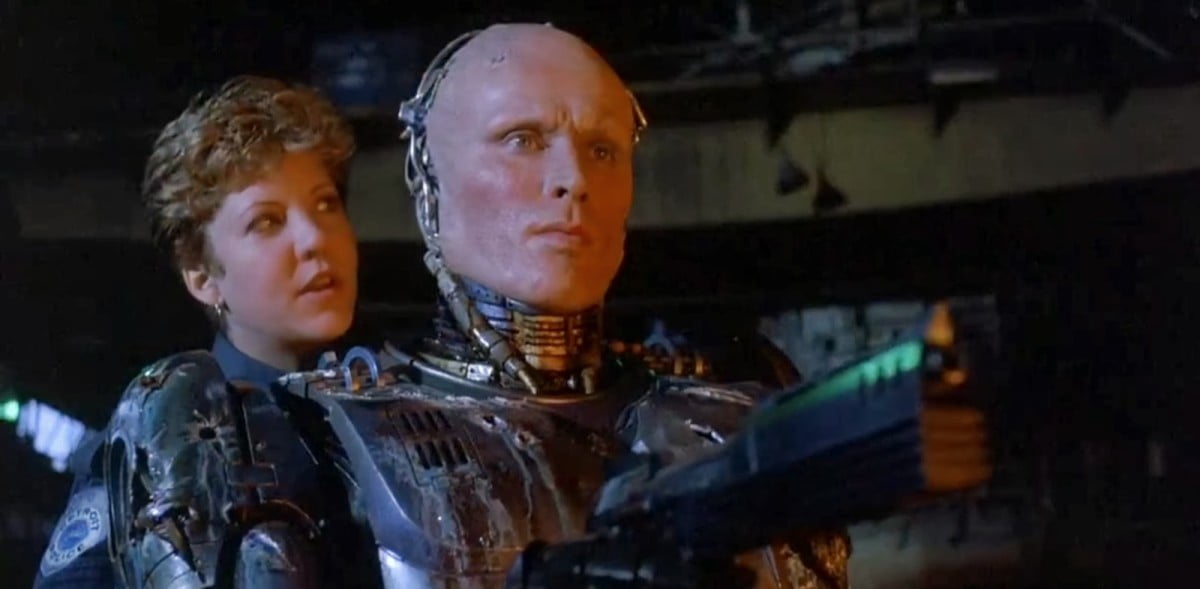
By Emad El-Din Aysha, PhD
“The sooner we admit our capacity for evil the less apt we are to destroy each other. ... People love seeing violence and horrible things. The human being is bad and he can’t stand more than five minutes of happiness. Put him in a dark theater and ask him to look at two hours of happiness and he'd walk out or fall asleep.”
--- Paul Verhoeven
I’d been agonizing for a long time to say something about the new Dune (2021) remake helmed by Denis Villeneuve, the French Canadian responsible for the annoying Blade Runner sequel. I’m a fan of the original Frank Herbert novel, have many sympathies with the David Lynch adaptation and absolutely love the Jodorowsky version, the greatest movie that was never made, so naturally I’m concerned how the remake will turn out, and I did not get positive vibes from the trailer – at all.
To add insult to injury I was watching a cool interview of an Indie moviemaker and he was complaining about how creatively bankrupt Hollywood was by insisting on gender flipping character for stories we already know and have watched. He cited, as a case in point the character of Liet-Kynes – the planetary ecologist – who has now been made into a woman, for no reason at all. The gender of the character was of no relevance to the character and what the character did and represented, the Indie director said, so why change it? That tipped me over the edge. I found that the said actress was Sharon Duncan-Brewster, a black actress from the UK. I also found that Dr. Wellington Yueh – played wonderfully by Quantum Leap’s Dean Stockwell – is being played by a Chinese dude, Chen Chang, while the Beast Rabban is being done by none other than wrestler Dave Bautista. None of this portends well, any more than the trailer, which I will get to much later.
I’ve never liked the scrawny reed-pole, somewhat effeminate boy playing Paul either, Timothée Chalamet, especially with his transparently American teenybopper accent. (He’s supposed to be from a noble family, have a refined groomed, aristocratic accent. Look at how great Kyle MacLachlan was in the role, and his voice and accent were perfect). They don’t seem to have his nemesis in this movie adaptation, Feyd Rautha, which makes sense since he can’t play off against this guy given that the original Feyd was also a stringy, effeminate type. (For the life of me I can’t understand why they got the tall, slender Stellan Skarsgård to play the Baron Harkonnen, a tub of lard who was so heavy he needed an anti-gravity suit to just walk).
These decisions seem to be, ‘seem’ to be, all directed by politically correct considerations, and this is a bad, bad sign of things to come. (If Skarsgård is as thin here as he is in real-life then that’s probably to make the body positivity people feel good about themselves. The same for the notoriously overweight beast Rabban, perhaps?) Not only is Mr Villeneuve breaking with what took place in the novel, which is bad enough in itself, his replacements for the characters go against the whole grain of the novel. The future world of Frank Herbert’s Dune is racially mixed, and deliberately so. The Harkonnen’s are pasty blond dudes with oversized lips; they’re too inbred and this is always a marker of cultural and genetic decline. That’s why another galaxy spanning war is needed to force bloodlines to mix again. The Atreides by contrast are very Mediterranean looking and racially mixed in their own way, as are the Fremen, the inhabitants of the planet Arrakis or Dune, the only planet that produces the spice mélange. Chani in the original novel is a dead ringer for Sean Young, with her elfin features, compared to the admittedly exotic looking Zendaya. And the race card won’t cut any ice with me, giving the offensively Nordic looking Lady Jessica they have in this movie, with the admittedly hot Rebecca Ferguson. (Francesca Annis was in the David Lynch movie, a bronze blonde Italian beauty, refined and regal but a warrior princess in her own right).
Look at it this way, to bring back Liet-Kynes. He was played by the very Nordic Max von Sydow, and for a reason. The original character in the novel was a galactic citizen who nonetheless had the blue-in-blue eyes of the Fremen, thanks to spice saturation. His Nordic appearance stands in contrast to his having turned native, being the secret leader of the Fremen resistance. It signifies his foreignness to them as a people and the great lengths he’s gone to, even in his own soul, to become one of them. The Fremen in David Lynch’s movie were played by Nordic actors themselves, which at first sight doesn’t fit their desert environment but fits in with the genetic diversity heralded by the novel and also works wonders visually because they look like Vikings, a warrior race if ever there was one. Can you convey that with Sharon Duncan-Brewster, with all due respect to her role in Rogue One, a favourite of mine in the Star Wars universe? And why on earth would you get Hispanic wrestler dude Dave Bautista to play a Harkonnen? How could he possibly be related to their inbred, all white bloodline? I thought he was going to play the Fremen tribal chief Stilgar, for crying out loud! And what’s with Chen Chang as Wellington Yueh, the traitor who sold out the noble Atreides to the dastardly Harkonnen’s?
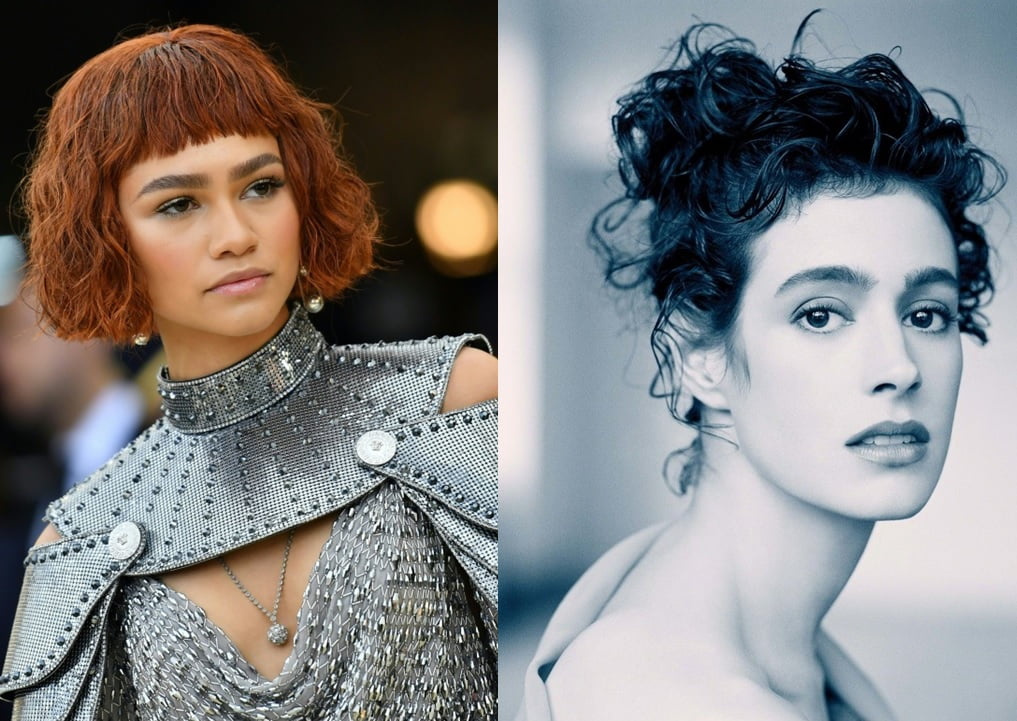
ELF IN THE ROOM: Zendaya compared to Sean Young. The armour-plated girl or the sassy woman? Spoilt for exotic choice aren’t we!
Hardly a poster boy for affirmative action, eh? This all brings back the bad, bad experiences I had with the Dune prequel novels by Frank Herbert’s own son, Brian Herbert, whom you could tell was using software to writer the boring repetitive prose and dialogue, with the worst kind of political correctness governing his character choices you could imagine. Duke Leto, you discover, has a mother who is black, and gets his jet black hair from her. Not a problem as such, here even though you don’t need it as an explanation given his classical Greek roots, going back to Agamemnon. But this self-same diversity quota mother is the evil, conniving one who married his father out of convenience and plots and schemes with the Harkonnen’s to kill her husband, Leto’s father. That’s hardly nice is it, making the token black women into a poisonous asp?! The feminism is jaundiced in the extreme as well. Men are turned into buffoons hoodwinked by their respective wives, especially the Padishah emperor and his henchman Count Hasimir Fenring, a pattern that long prefaced what happened to the male characters in the new Star Wars trilogy and MCU movies increasingly. Nothing of the sort was the case in the original novel. The problem with the emperor, as we’re old verbatim in Children of Dune, is that he got too bookish and relied on plotting and scheming instead of sticking to the warrior ethic of the Sardaukar, which proves that he’s a smart guy. As for Fenring he went on sexual missions with his wife, a Bene Gesserit woman, knowing full well what she was getting up to and who she was being impregnated by and to what ends. (Yuk). Fenring, moreover, had a noble and brave heart, after all that, sparing Paul’s life at a critical moment that could have changed history forever.
Then there’s the Bene Gesserit, which I will get to again with that damnable trailer. In the original Frank Herbert novel they are evil and scheming, no doubt, but have a philosophy governing them that is commendable, are very impressive when it comes to their mental and physical abilities, but also have their limitations and inherent weaknesses. In the prequel novels they are made out to be disgustingly cruel, sexually dominating of men (relying on blackmail instead of hypnosis and seduction) and all-powerfully invincible, except when it’s convenient to the plot. I was looking forward to a fight scene between a Bene Gesserit operative and some Sardaukar troops in one of the prequel novels, only for her to conveniently get zapping in the back from behind and forcing her into the same sexually subservient position as the previous operative he was sent to save. Talk about a banana peel placed in the wrong part of town at the right time of day!
Now for that annoying trailer I keep harping on about. Practically the only properly cast person in the Villeneuve universe of Dune is Oscar Isaac as Duke Leto Atreides. He is an actual Mediterranean dude, being Cuban, handsome, charismatic and versatile as an actor who’s done aristocratic types before. And so what do they do with this studmuffin? Obviously, they degrade his sorry ass in a way that is inexcusable in itself and completely, completely, out of whack with the original novel. (Same as they did to him in Last Jedi and Rise of Skywalker). Even the prequel novels didn’t lambast the guy like this trailer did. You have an annoying scene where the Bene Gesserit are testing Paul to see if he’s the one they’ve prophesized for all these years and what do we hear from the chief priestess? Instead of what you have in the novel we get this sexualized, gender mumbo jumbo:
Gaius Helen Mohiam: You've proven you can rule yourself. Now you must learn to rule others, something none of your ancestors learnt.
Paul Atreides: My father rules an entire planet.
Gaius Helen Mohiam: He’s losing it.
Paul Atreides: He’s getting a richer one.
Gaius Helen Mohiam: He’ll lose that one too.
If none of Duke Leto’s ancestors could rule themselves, how come they were so successful at ruling their lush green homeworld Caladan, to the point that they pissed off their opponents the Harkonnans, people who already controlled Arrakis? If Duke Leto, known as Leto ‘the Just’ (someone who impresses even Liet-Kynes) couldn’t rule himself let alone his planet and the new one he was getting, then why was the emperor deathly scared of him, cooperating in secret with the Harkonnans against him? The whole problem the emperor is facing is that his bloodline is coming to an end, having no sons, and so Leto who is popular among the other noble houses could ascend to the throne through a royal wedding. This is a guy destined to rule the galaxy, not just a piss poor planet. And nothing could be farther from the truth as to Leto the Just being able to rule himself. His whole problem, in the original novel, is that he’s too damned in control of himself, his feelings and instincts. Lady Jessica, in the novel, complains about how he buries his emotions, how sweet and gentle and loving he is, and how if it were up to him he’d live his life out in his mansion in the mountains and dedicate his life to love. If it weren’t for his duties as a Duke, inherited from his ruthless father who was a good and noble ruler in his own right, getting himself killed in a bullfight to impress the masses and win their favour.
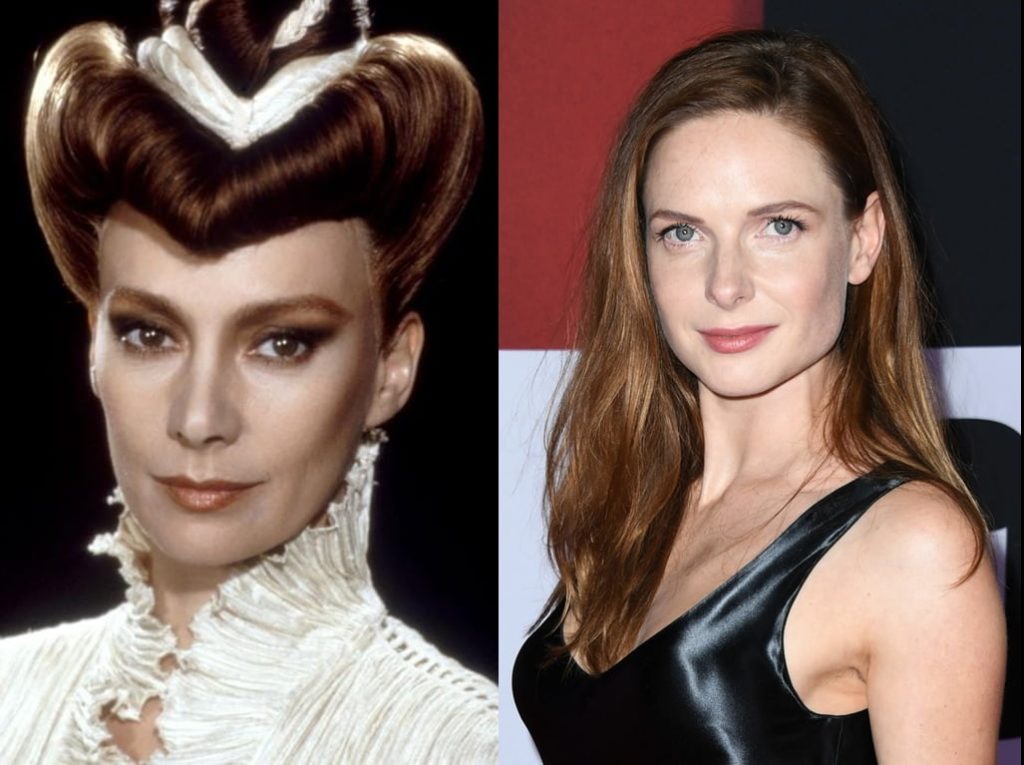
TWIN TOWN: Francesca Annis and Rebecca Ferguson for the Lady Jessica. I wonder who can tan better on a Mediterranean planet?
In one key sequence the Duke is forced to allow his men to spy on the Lady Jessica, because they think she’s a Harkonnan agent. He’d never believe that himself about her but he takes that unenviable decision because he knows he has to be impartial and earn the respect of his troops. When she find out about it, he doesn’t even apologize to her, because he knows that she knows that he’s not meant to say sorry, since it’s part of his Machiavellian duties as a lord. (Not to mention Thufir Hawatt explaining that the Duke’s army could match the Sardaukar, which got the emperor’s knickers in a twist). Duke Leto’s ultimate undoing however was his undying love for his son, someone he knew was meant to be a Messiah, with dreams of the future, and so he gave up Caladan for the barren plains of Arrakis to help the sleeper in his son awaken, taking rash decisions that were too cold and ruthless, alienating potential allies on Dune and falling into a trap set by the emperor himself. That’s not a mistake his ancestors would make, mind you, given how cold and ruthless they were. And if anyone was not in control of themselves, it’s was the Lady Jessica, since she’s broke her Bene Gesserit code and had a boy for the Duke, instead of a girl as the Bene Gesserit required of her. So take that you make believe feminists!
The Dune prequels, as said above, were ridiculous in this regard. They didn’t make fun of Duke Leto but they did have women where they weren’t called for, as advisers to lords and special forces commandos in royal armies, even if the lords in question are backstabbing assholes who oppress women, peasants and other minority types!!
We should follow this up with a discussion on how to do diversity right and how not to do it wrong.[1] Here’s a very poignant science fiction example, if ever there was one. Compare the classic of classics that Robocop (1987) is to the travesty that is the reboot, remake from 2014. You have the hero, Murphy (Peter Weller), who is a white dude true enough but he has a quite literally female kickass partner Lewis (Nancy Allen), a black boss Sgt. Reed (Robert DoQui) and is a Catholic and devoted husband and father, so him being white doesn’t exonerate him from being a minority himself. Not to mention a too dedicated cop who gets himself horrendously murdered on his first day on the job in downtown Detroit. Now contrast this to the messed up farce that is the remake, with Alex Murphy played by Joel Kinnaman, the annoying macho bullshit actor from Suicide Squad and Safe House. He’s unlikable from the word go and his family antics are unimpressive, to say the least. This by itself messes up any character arc since he starts out as a hard case, not needing a robosuit to take the law into his hand, whereas the original Murphy stopped himself from taking his revenge through his directives as a robotic policeman. Lewis in the 2014 version is black – whoopee do, since he doesn’t really do anything compared to Nancy Allen’s wonderful performance – and Murphy’s boss is also black, but a woman and, get this, is corrupt and has him bumped off in his former life. Remember what we said about Duke Leto’s conniving prequel mother?
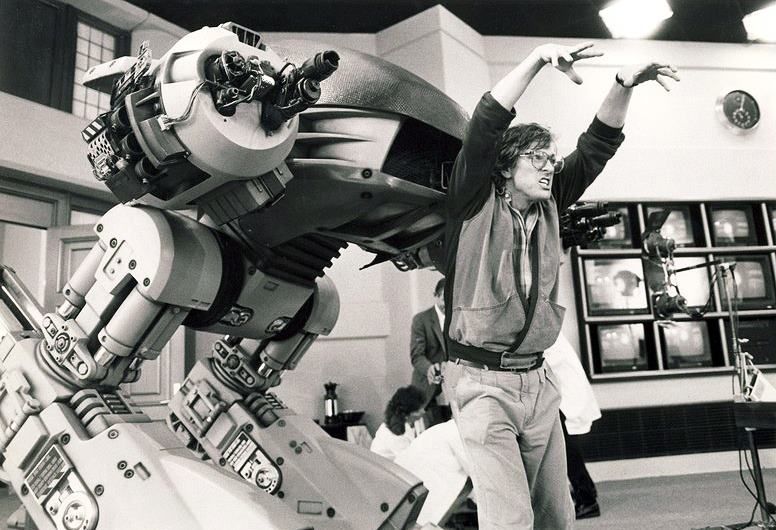
MONSTROSITY REPORT: Paul Verhoeven on the set of Robocop, an anti-capitalist crusader for our superficial times.
The original bossman, Sgt. Reed, deserves special mention here because he broke the stereotype of the fat, plains clothes dressed cop bossman who does nothing but yell at his maverick, invariably white detective hero underling. Here Reed is physically fit and the dedicated type who is terrified of the cops going on strike because it would mean the city tearing itself apart. Even when he meets Murphy for the first time he tells him to suit up because they work for a living here in downtown Detroit, unlike the nice neighbourhood Murphy was stationed in. And then there’s another diversity lacuna everyone’s missed. The main badguy nemesis in the 1987 movie is Clarence Boddicker (Kurtwood Smith), the guy who massacres Murphy. He’s one of the best badguys to ever grace the silver screen, with lots of idiosyncrasies that mark him out, including his glasses that are meant to make him look like Heinrich Himmler. And he also leads a ‘diverse’ set of criminals that all have one thing in common – their ferocious loyalty to their boss. One looks Vietnamese, one is black, one I suspect is gay (the most violent and angry one in fact who hates college boys), one who is like a no nonsense foreman at a factory, etc. The equivalent for Boddicker in the 2014 is some suave sophisticated ponce who drinks wine and has misgivings about killing cops and I think all his gang members are white, which exposes just how skin-deep the concern with diversity is in the reboot. The first movie wasn’t trying to be diverse, mind you, it was just trying to be accurate, portraying a future world where sex, class and race don’t matter either to cops or robbers, just how efficient and dedicated you are.
The locker room in the police department in Robocop (1987) has women undressing with the men, just like the shower scene in Starship Troopers, both directed by the ultra-politically ‘incorrect’ Paul Verhoeven, of Basic Instinct and Showgirls fame.[2] Not all of his Dutch movies were that liberal either and pissed off many a sexual minority. The director of the 2014 movie, José Padilha, is Brazilian and about as politically correct as you can get, and it seems his hands were tied here so we should cut him some slack. (Myself included since I used to hate his guts). It’s the studios who were feeding us lukewarm, skin deep political correctness, and in the worst way possible by having the supremely moral white guy played by Gary Oldman while African-American Samuel Jackson was the morally reprehensible dude. (Look what they to him in Captain Marvel, a mockery of the Nick Fury character, the coolest black guy since Sidney Poitier). I’d also say the feminism is skin deep too. No actually, even shallower, since they make Murphy’s wife quiet proactive but all the other women useless, and even her pro-activeness gets her nowhere. And she’s a platinum blonde, in contrast to Murphy’s feisty brunette wife in the original movie; a Disney, Barbie-type family.
I’ve always said that art should be for art’s sake instead of for society. Or, more accurately, the best way to serve society is to let artists do their own thing, do art because they like it and find its fun and exciting and feels relevant to them, and in the process hit on the right way to tackle societal problems and antagonisms. But forced, formulaic approaches end in rubbish. And just to hammer home the point here is Anatoly Lunacharsky (1875-1933), a Soviet art critic and so the most unlikely person you could imagine endorsing this point of view:
... The Marxist critic must not prize only works which are devoted to problems of the moment. Without denying the special importance of current problems it is completely impossible to ignore the tremendous significance of issues which at first sight appear too general and remote but which, in fact, on closer inspection, do exert an influence on social life.
Here we have the same phenomenon as in science, to demand that science give itself up entirely to practical tasks is a profound error. It is a well-known fact that the most abstract of scientific problems can, when solved, sometimes turn out to be the most fruitful.
(Lunacharsky, On Art and Literature, [English version published 1965, 1973], pp. 14).
So much for socialist realism or ‘scientific’ socialism. Science is not the same thing as technology. It’s about the veracity of knowledge, not practical applications and solutions to immediate problems. Knowledge as its own end, its own reward; or science for science’s sake, as the saying goes.
The best way to do ‘diversity’ then is to not do it, deliberately, but instead let it grow organically as necessity dictates and no more. Or, as my motto goes, art for art’s sake, for society’s sake!!!
NOTES:
[1] Please check out this wonderful video by Christina Alongi: “How to Write Diverse Characters in Science Fiction and Fantasy”, Dragons, Zombies & Aliens, 13 December 2020, https://www.youtube.com/watch?v=nQ2zOY0TYco&t=1202s. Even someone as cynical as me can’t help but be impressed!
[2] People also forget the scene where Casper Van Dien gets whipped, by a black boy, in Starship Troopers. Talk about race reversals, but there was no ‘quote’ system there anymore than there was diversity in Isaac Asimov’s original Foundation trilogy, something it didn’t suffer as a result of because we could all identify with the geeky or roguish characters on display, just as we could in the original Star Wars, which is more than I can say for the new trilogy with their systematic disdain for white men.

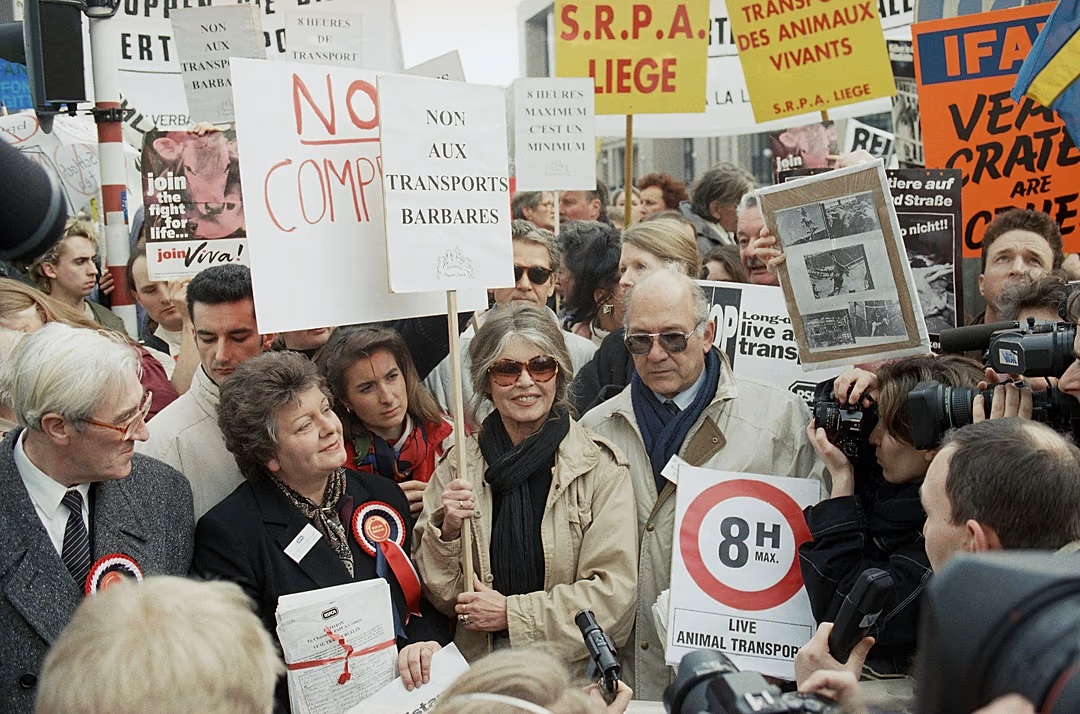


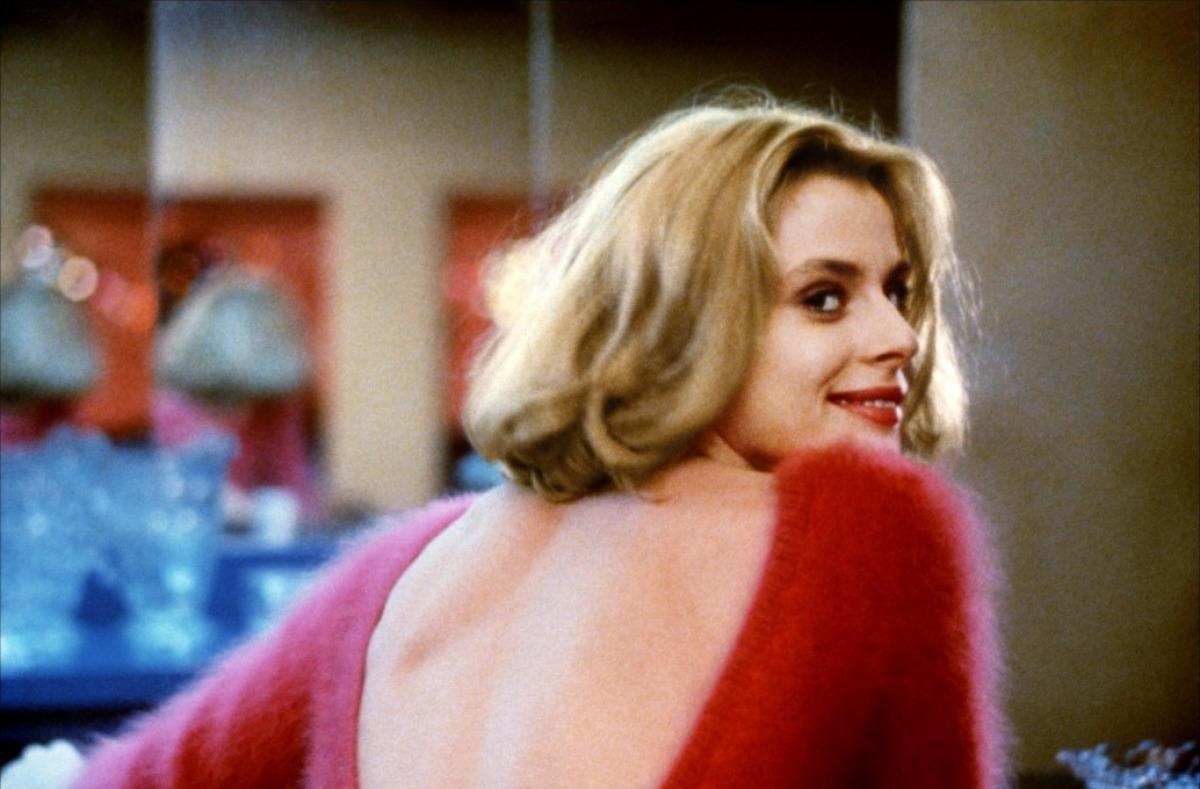
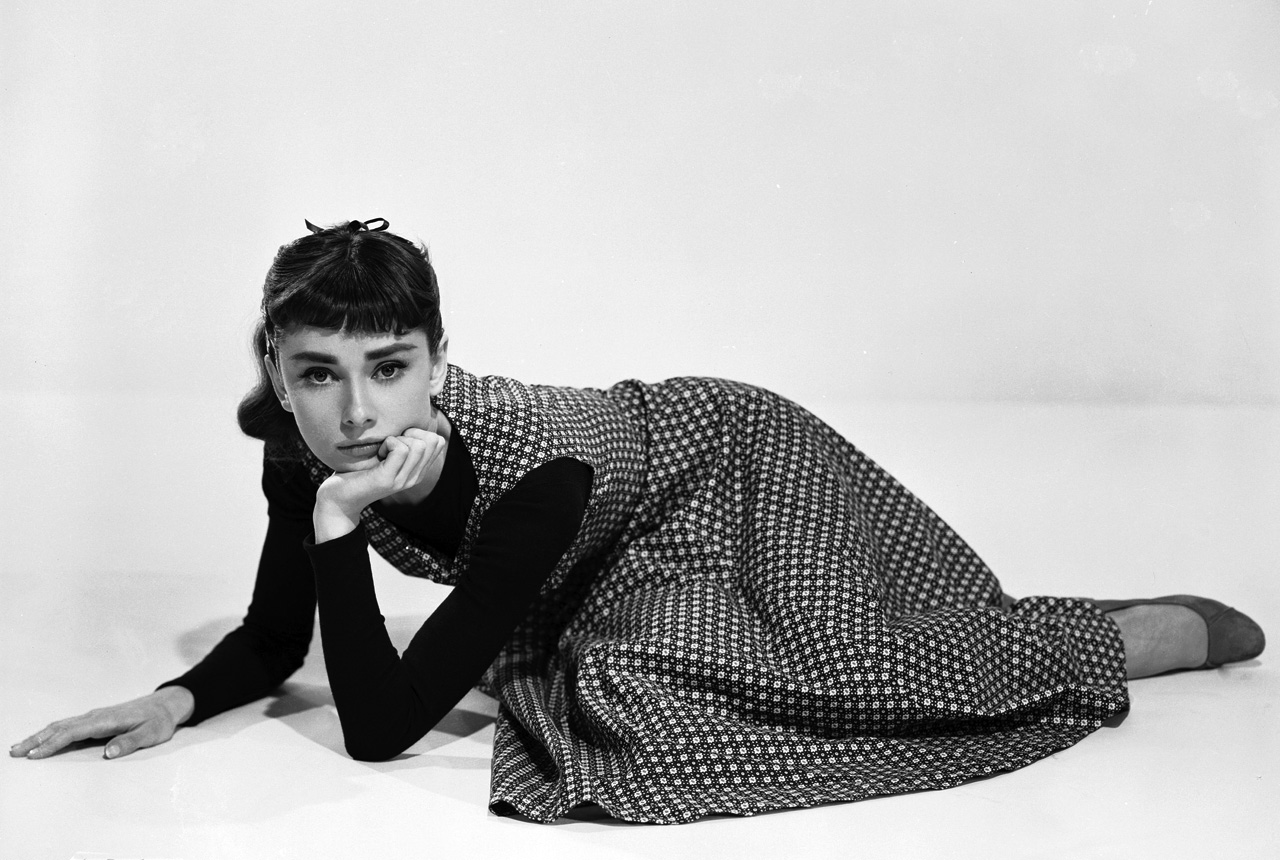
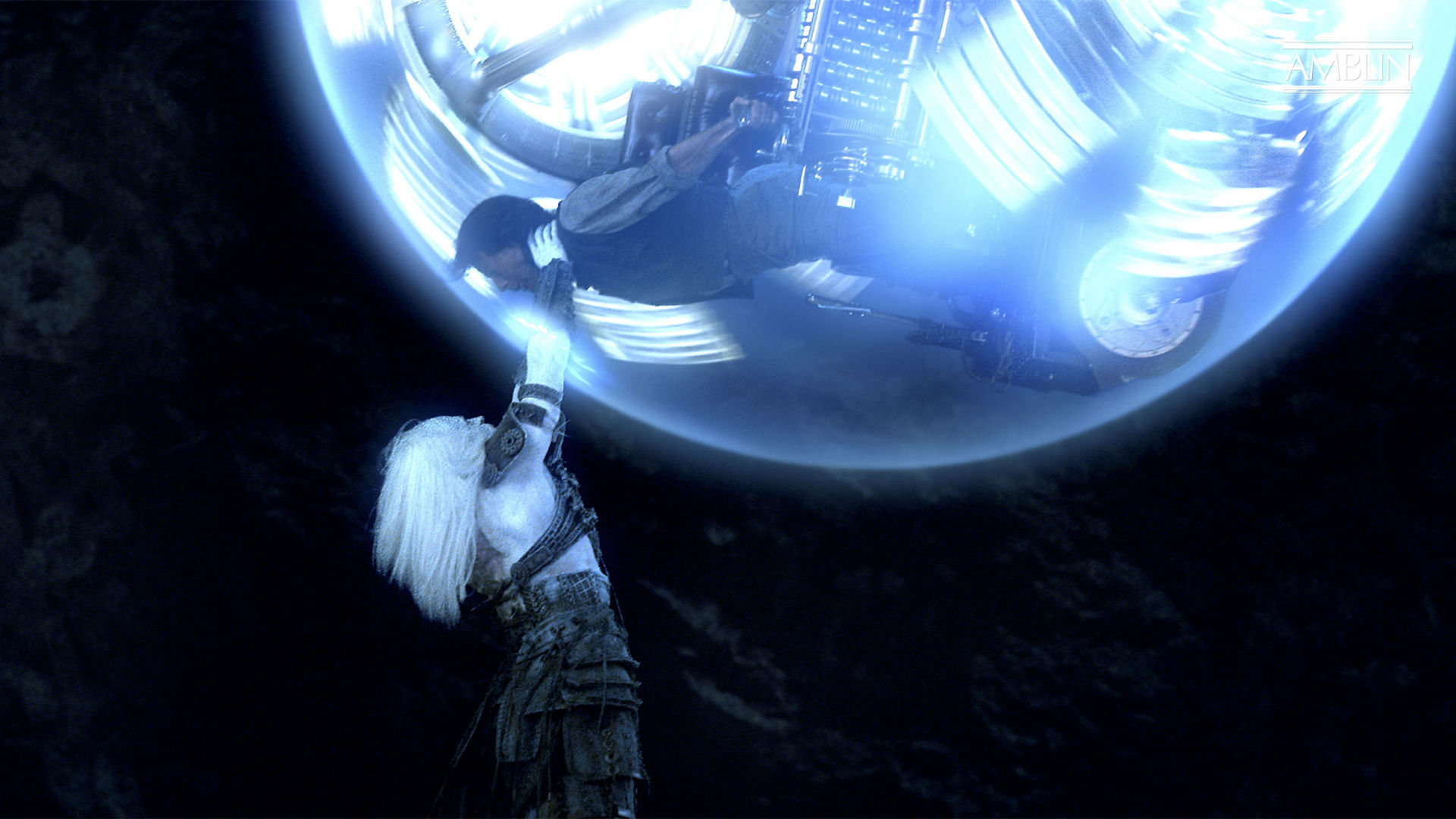
I checked the Dune novel - got a fulltext - and to be fair the Bene Gesserit woman does make fun of Duke Leto by saying he can't rule himself. But in the discussion that follows Paul defeats her on some points:
Paul shrugged. “Then she said a good ruler has to learn his world’s language, that it’s different for every world. And I thought she meant they didn’t speak Galach on Arrakis, but she said that wasn’t it at all. She said she meant the language of the rocks and growing things, the language you don’t hear just with your ears. And I said that’s what Dr. Yueh calls the Mystery of Life.”
Hawat chuckled. “How’d that sit with her?”
“I think she got mad. She said the mystery of life isn’t a problem to solve, but a reality to experience. So I quoted the First Law of Mentat at her: ‘A process cannot be understood by stopping it. Understanding must move with the flow of the process, must join it and flow with it.’ That seemed to satisfy her.”
---
The point is that what the Bene Gesserit woman says is her opinion, not a fact and not the view of the author, and the stream of events disproves her in the end. The Duke was a good and noble and self-disciplined man and the trailer seems to be glossing over this in an attempt at character assassination.
[…] my reservations about the Dune trailer and the whole gender and race swapping which has become endemic of Hollywood and the American […]
[…] the Dune prequel novels and the forced and phony feminism in them?) Citing Chris Gore[3] I’d argued previously that gender and race-swapping the character of Liet Kynes was pointless because the character gets […]